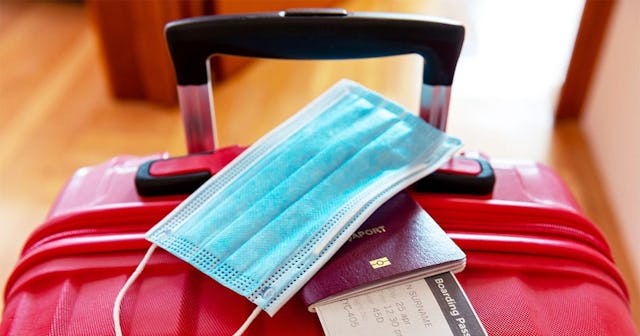Vacation Or Staycation? An Expert Weighs In To Help Us Decide

Summer is just not the same for any of us. Do we travel? Do we stay at home, and maybe buy an inflatable pool to help us escape on those hot summer days? If you’re like me, your summer plans were canceled or drastically altered. Gone are the trips to grandparent’s homes and outdoor amusement parks, yet we still have a nagging urge to provide a memorable summer experience for our kids. Or we really just want to escape the confines of our house for a little while.
Don’t lose hope — we have answers! Scary Mommy spoke with Dr. Niket Sonpal, NYC Internist and faculty member at Touro College of Medicine, who says it isn’t impossible to travel someplace new this summer. The reality is, the COVID-19 virus is not leaving us anytime soon. As we learn to adapt to what may be a long road for us all, we can continue to put necessary precautions in place to keep our own families safe as well as others. Here are a few tips for you to consider as you decide whether taking a vacation away from home is best for you and your family.
ljubaphoto/Getty
Each day when we turn on the news, we learn something new about the spread of COVID-19 in the United States — and around the world. As of today, Dr. Sonpal tells us, “Maine, New Hampshire, Vermont, Montana, New Mexico, West Virginia, South Dakota, and Wyoming are the states presently with the fewest numbers of COVID virus,” and taking a trip to any of these states puts our families less at risk (though side note, just because they’re less risky doesn’t make them “safe”). If you’re curious about what you can do in any of these states, check out our travel guide.
If you choose to plan a getaway with your family, how to get there is another decision you’ll need to consider. Dr. Sonpal shares that a car is the safest, as you are not exposed to hundreds of strangers like in an airport while waiting on crowded security lines, luggage lines, standing in a jetway, and on a plane. With trains, you still have to deal with a lack of social distancing at the station and train cars that could be crowded as well as sitting next to people outside of your “quarantine” circle.
“When traveling by car, you can control who you are exposed to,” says Dr. Sonpal. “When you stop to get a drink or something to eat, you can do so at an outdoor establishment, and wear your mask until you are served your food and sit six feet away from those not traveling with you.” Phew!
So let’s say you’ve decided to take a car to travel to Vermont, but wonder if you’ve been as safe as you could have been at the rest stop. Dr. Sonpal gives us the top five precautions we can take to keep our family safe while traveling.
- Parents must go over proper “hands-off” mouth “hygiene” before they take a trip. If the children are very young, you might want to do some role-playing, such as, “we are using a restroom at a rest stop, show me what you are going to do after you use the bathroom?” Watch your children wash their hands.
- Make sure they are cleaning the tips of their fingers and the backs of their hands. Parents should emphasize that children should touch “things” outside of a car or hotel room only when necessary.
- Make sure your child knows how to properly wear a mask and remove it so as not to contaminate it.
- Remind them not to rub their eyes when their hands have not been sanitized.
- If you are visiting a hotel that has activities for children, assess what those are and see if they are socially distanced. Tennis lessons, waterskiing, and paddleboarding are a better idea than activities that involve contact.
fabio camandona/Getty
Regardless of where you choose to stay when you reach your destination, you’d take the same precautions you would if you were home: stay away from large crowds. If in a hotel or Airbnb, Dr. Sonpal reminds us to ask the necessary questions — like when were the surfaces cleaned last? And if you’re using the utensils left in the guest room, be sure to properly sanitize them.
Like you would under normal circumstances, Dr. Sonpal reminds us to clean all high-touch areas in a room, hotel, or otherwise, such as phones, TV remotes, light switches, handlebars, and doorknobs, faucets, toilet flushing handle, and seat. You want to also wipe down flat surfaces like a desk, nightstand, and bathroom counter. In the end, we need to make the best decision for us, our mental health, our physical health all while keeping our family’s health a priority. (But if you ask me, all that cleaning doesn’t sound like much of a vacation.)
We are living through unprecedented times, as we keep the safety of our family (and others) in mind, go ahead and plan something fun — but Dr. Sonpal strongly recommends making that vacation a staycation. If you can avoid getting on a train or plane right now, that is the safest option. Also, he notes, “By staying local, you will most likely be aware of mask laws, restaurants that are ‘safer,’ and areas that tend to be less crowded.”
Depending on where you live, you can plan a hike, a picnic, a socially distanced BBQ, or perhaps rent some water equipment like jet skis or paddleboards if you can drive to a lake or a bay. But whatever you choose for you and your family, to stay or to go, keep in mind that wearing a mask doesn’t change just because you cross over state lines.
This article was originally published on